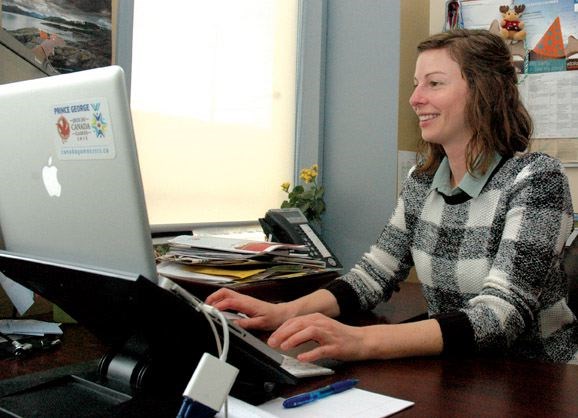For two weeks in February, athletes and their families from across the country illuminated the north during the 2015 Canada Winter Games in Prince George.
The Games, the largest multi-sport event in the country, shone a spotlight on the city like never before.
Now that the Games are over and organizers, volunteers and sport organizations have had a chance to unwind and debrief, what happens next?
It's a question Leanne Schinkel, Tourism Prince George's manager for sport and development, is asking. It's what she asked a group of Prince George sport organizations during a break-out session at Tourism Prince George's annual general meeting on April 23.
It was a chance for the groups to share ideas and build on the momentum.
"We're (the city) not what we were before the Games, but we need to determine what that is," said Schinkel. "We are way more of a player (in hosting sports events) than we were before. We think we can do it.
"Everyone is interested to see where we can take this. If the Canada Winter Games had a legacy of getting everyone into the same room together then that's awesome."
Schinkel attended a Canadian Sport Tourism conference in Toronto at the end of March and the feedback she received from the national sport organizations that were at the Games was 100 per cent positive. She heard the biggest issue was the spectator capacity at some of the venues.
In a recent Canada Winter Games survey done by a UNBC political science class, 44 per cent strongly agreed that the Games increased civic pride in the city.
Schinkel said perhaps the biggest asset Prince George had during the Games was its army of volunteers who were excellent ambassadors for the city.
"We shouldn't have been surprised about the support (of the Games) by the city," said Schinkel. "(In the survey) 82 per cent want to host a similar event in the future.
"I feel there's been a shift (in attitudes). People are excited about Prince George from what I've seen and it has become more and more positive."
Schinkel, who grew up in Saskatoon and arrived in Prince George two years ago, said it's really unbelievable that a city of 75,000 people has so many sports to participate in and how dedicated we are to them.
"And the sponsors support the community. People see the positive benefit of sport and people are using events as a mechanism for social and community change. It's so much more than who wins or loses. It's about the community and leaving something positive behind. It's impressive that sports can do this."
But post-Games, she said people want to know what's next and that momentum has to continue.
A lot of it comes down to funding and it's a matter of creating sustainable funding models.
Even before the Games, and now after the Games, in her role of sport and event development, Schinkel will work with sport organizations throughout the bid process for provincial, regional, western Canadian and national events. She'll arrange and host site visits, she'll arrange for value-added additions to the event, put together welcome and promotional packages, arrange for visitor services at the host venue, and provide economic assessments through the Canadian Sport Tourism Alliance's Sport Tourism economic assessment model.
She said the test events leading up to the Games generated a positive economic impact of more than $2 million.
A lot of groups have used Schinkel's expertise already.
"These sport groups (in Prince George) volunteer because they love the sport," said Schinkel. "We have fabulous facilities here and I'm just supporting these groups.
"What's so great about my job is that I'm promoting Prince George. Our mandate as an organization is to create and increase visitation so more people are spending a night here. Sport differs because it can be expensive when (athletes are) competing here. We try to convince them to come back.
"Truth be told that location is our biggest struggle and we can help groups entice other groups to come here."



